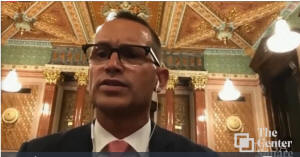Sweeping energy legislation stalls again at Illinois statehouse
 Send a link to a friend
Send a link to a friend
 [September 01, 2021]
By Greg Bishop [September 01, 2021]
By Greg Bishop
(The Center Square) – Legislation to close
coal-fired power plants by 2045 while propping up nuclear power and
green energy programs stalled out again at the statehouse, but work
continues on the bill.
After hours of delays for a Senate committee taking up the bill Tuesday,
Democrats said there wouldn't be a vote. Pat Devaney, with the AFL-CIO,
said labor is now fully on board. He said there’s hundreds of millions
of dollars and tens of thousands of jobs at stake and looming closures
of nuclear plants would hurt a climate group’s objectives.
“There are many things that happen, that negatively affect climate, if
we don’t pass legislation now,” Devaney said.
Juliana Pino with Little Village Environmental Justice Organization said
they’re still opposed to the measure. When pressed by state Sen. Sue
Rezin, R-Morris, who has a nuclear power plant in her district, about
what they’re looking for, Pino said they won’t bend on forcing the
closure of coal-fired plants.
“Our plan is clear, fast renewable development, reliable interim
reductions at existing plants, predictable closure dates, mitigating
pollution where it needs to be mitigated first,” Pino said.
[to top of second column]
|

Pat Devaney with the AFL-CIO, state Sen. Sue Rezin, R-Morris,
and Juliana Pino with Little Village Environmental Justice
Organization during a Senate committee hearing on energy.

There was also opposition from the Illinois Manufacturers’ Association,
which said the measure will lead to the largest electric rate hike in
Illinois history and will hit the manufacturing sector “extremely hard.”
“Manufacturers use one-third of all energy in the
United States,” IMA President and CEO Mark Denzler said.
“Manufacturers are committed to sustainability and reducing energy
usage. In the last decade, manufacturers have reduced emissions by
21% while increasing output by 18%.”
The Illinois Chamber of Commerce also opposes the bill.
It’s unclear when the measure will advance. |